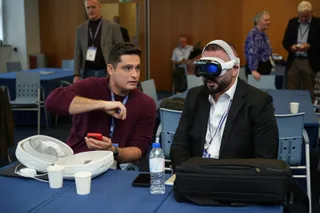Alaska Invests in New Training Technology as Recruitment Rises
Contact Our Team
For more information about how Halldale can add value to your marketing and promotional campaigns or to discuss event exhibitor and sponsorship opportunities, contact our team to find out more
The Americas -
holly.foster@halldale.com
Rest of World -
jeremy@halldale.com

Hundreds of new pilots are being hired at Alaska Airlines and Horizon Air, and as a result Alaska is investing in new technology to expand its training department.
Alaska’s latest innovation is a partnership with VRPilot, a Danish technology company. Alaska has worked with them to virtually reconstruct its 737 flight deck as a training aid for pilots who are new to the aircraft. One of the first things pilots learn is the layout of the flight deck and the purpose of every switch and button. Offering new pilots an opportunity to put themselves “inside” the flight deck where they may need to crane their neck or lean to reach a switch is a much more realistic teaching tool than photographs in a book or video tutorials, explained the airline.
Virtual reality will augment existing traditional training techniques where the airline expects it will result in better-prepared pilots, higher success rates through training, and more time for complex instructor-led training activities. With this technology, pilots can familiarize themselves with the location of switches before they step into a simulator.
Horizon Air, Alaska’s wholly owned regional partner, will also soon be using the same technology with its regional pilots. This technology also provides an opportunity to use virtual reality in our other workgroups like maintenance and engineering, ground service and with cabin crew.
With so many pilots coming through training, Alaska needed more flight simulators. In its largest simulator order to date, the airline has ordered two new fixed-base simulators and three new full motion simulators. These training devices are being installed throughout 2023 and all will be operational by the end of 2024. This will bring the airline to a total of 18 fixed-base and full motion simulators. Horizon Air has ordered an additional simulator to train pilots on the now single fleet of Embraer E-175 aircraft. This will give Horizon two owned simulators and priority access to a third in Seattle.
“These significant investments in simulators and emerging virtual reality technology will continue our commitment to rigorous pilot training,” said Capt. Jeff Severns, managing director of pilot training.


